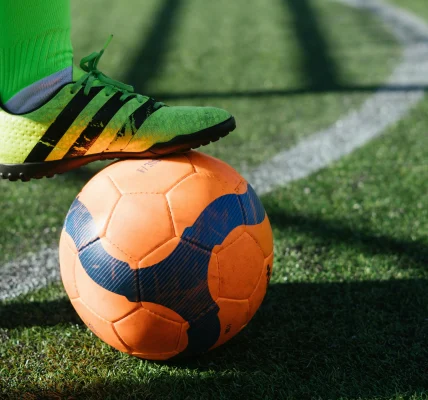The great stakes in top football call for exceptionally talented athletes. Athletes pushing their body straight up to the limit develop strength, endurance, and speed. Many great athletes will agree, but on the field success is more psychological than physical. Great football performance along with mental toughness helps athletes to stay focused, under control pressure, and bounce back from mistakes. Researching the methods they do to develop mental resilience and perform at their best when it most counts helps professional football players’ brain to reach optimal performance.
Why Is Mental Toughness Important In Football?
Like other major sports, football has a very little margin for error. Usually, one fast choice or action distinguishes success from failure. Under these conditions, mental capacity might be very crucial. Those who can remain focused despite distractions, cool under pressure, and quickly recover from mistakes will most likely achieve the highest levels.
Mental toughness helps athletes to overcome psychological and physical obstacles. It helps them to meet the high standards established by coaches, media, and supporters. Particularly in trying conditions, this tenacity is very crucial for penalty shots, big tackles, or injury time targets.
Key Elements of Mental Power
1. Focus
During high-stress matches where distractions abound, keeping total concentration is absolutely critical. Great athletes have the mental discipline to be present and concentrated on the current activity whether the audience is roaring, the pressure of a knockout match, or even personal troubles.
Great effort is done by top athletes to raise their degree of focus. By means of “mindfulness” exercises, which enable people stay anchored in the present rather than caught in ideas of past mistakes or future results, training their minds to focus on what they can control—that is, their performance, posture, or decision-making—helps people raise their capacity for under pressure performance.
2. Proper Regulation of Emotions
Football is one of emotional games with highs and lows. Mastery of these emotions will help us to behave somewhat precisely. Top football players understand they cannot pass for their judgment in response to anxiousness, annoyance, or anger. They employ techniques for emotional regulation so that their performance is not influenced by their emotions.
Two most vital abilities are understanding oneself under pressure and how to behave discreetly and clearly. Regular exposure to these circumstances allows pupils to become more suited for regulating their emotions during actual sports.
3. Self-Confidence
Elite football players particularly under difficult conditions or against fierce opponents have to rely on their own skills. On the field, confidence enables athletes to depend on their instincts, perform bold plays, and accept calibrated risks. Players gain confidence by means of support of their capacities, vision, and positive reinforcement. Sports psychologists assist athletes develop a “growth attitude,” which enables them to view challenges as opportunities for personal development rather than as hazards to their goals. Knowing that learning is a process with mistakes inevitable helps athletes to grow confident by means of error recovery.
4. Resiliency
In Football it is crucial to remain resilient, that is, having the capacity to keep high standards and recover from hardship. Many variables such personal issues, lost games, and injuries can and will have an effect on the player’s mindset. Good football players can develop resilience via solid emotional and professional support systems. Many actively create under pressure action plans in cooperation with sports psychologists. Emphasizing on how their experiences will enable them to grow, they also start to regard challenges as fleeting. This method lets people stay motivated, thereby helping them to keep their optimum performance even under tough circumstances.
Psychological Development Required For A Perfect Performance
Psychologically one cannot grow over a night. Like physical ability, it depends on persistence and willpower as well as lifetime learning. Great football players utilize several strategies and concepts to become more psychologically strong and convince themselves they are qualified for the obstacles they will encounter.
1. Visualization
Among the most regularly applied techniques in sports psychology is visualization. Especially situational mental preparation assists athletes to boost their performance and confidence. While a goalkeeper could witness important saves during a penalty shootout, an attacker could have several goals from several angles. This form of mental habit enables athletes to be less anxious and more ready in the surroundings of the real game.
Visualizing also helps athletes to improve their reflexes and predict probable difficulties. Those who feel they are overcoming challenging situations might lower their fear of failure and improve their under pressure performance capacity.
2. Relaxation and Breathing Techniques
Particularly in high-stakes games, stress and anxiety could fairly negatively impact a player’s performance. Many professional football players employ relaxation methods and breathing exercises in order to remain calm and focused. Among the techniques players might adopt to remain cool under duress include meditation, deep breathing, and muscle relaxation.
Breathing exercises are basic but a crucial ability that sportsmen might use all while a game. Those who pay great attention to their breathing may reduce their pulse rate, relax their head, and once more engage in emotional regulation. This keeps individuals concentrated and allows under pressure decisions to be carried out.
3. Setting A Realistic Goal
Building mental toughness also depends much on having sensible goals. Both long- and short-term objectives offer great athletes direction and motivation. Short-term objectives such as raising a certain level of performance allow athletes concentrate on the technique rather than the outcome. Long-term objectives like championship victories motivate sportsmen to keep dedicated to their own growth.
Those who separate more ambitious goals into reasonable chunks help to avoid feeling overburdened. Encouragement of what one can influence and celebration of little successes along the path can help people to strengthen their confidence and good attitude retention.
Sports Psychologists And Their Duties
Sports psychology shapes contemporary great football mainly. Teams looking for sports psychologists to assist athletes in developing mental resilience and controlling the psychological demands of their particular activity are increasingly seeking after them. Dealing personally with sportsmen, these professionals offer skills, direction, and motivation for better mental resilience.
Sports psychologists often help athletes heal from injuries, hence their emotional burden may be really severe. They enable athletes to stay focused on their recovery, manage their emotional toll from being sidelined, and retain a good attitude. This greatly increases the players’ chances to return on the field with the same degree of mental toughness and confidence they had before their injury.
In conclusion, football calls for physical ability even if the greatest players stand out for their mental tenacity. Top football players understand that even under demanding conditions, focused, confident, strong even demands brain development. People help themselves to operate at their best separate from the environment by means of envisioning, goal planning, and emotional control techniques.
As football advances, the psychological component of the game will become even more significant. Not just by surviving the challenges of their sport, but great athletes also grow mentally strong by living under their demands on the most well-known settings.



